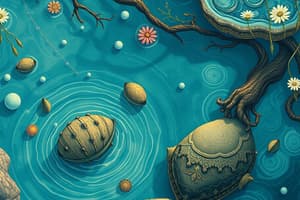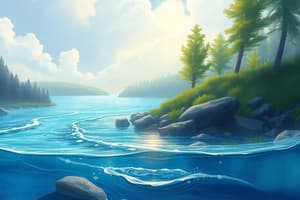Podcast
Questions and Answers
Freshwater is found in glaciers, rivers, lakes, soil, and ______.
Freshwater is found in glaciers, rivers, lakes, soil, and ______.
groundwater
Saltwater is primarily found in the ______.
Saltwater is primarily found in the ______.
oceans
The hydrologic cycle ensures that water is naturally ______ on Earth.
The hydrologic cycle ensures that water is naturally ______ on Earth.
replenished
Floods are an overflow of water onto what is normally ______ land.
Floods are an overflow of water onto what is normally ______ land.
Droughts are a long period of little to no ______ in a specific area.
Droughts are a long period of little to no ______ in a specific area.
Excess fertilizers from farms can lead to rapid ______ growth in water bodies.
Excess fertilizers from farms can lead to rapid ______ growth in water bodies.
Resource management can be viewed from a human-centered or ______-centered perspective.
Resource management can be viewed from a human-centered or ______-centered perspective.
To reduce our impact, we can ______, reuse, recycle, recover, and refuse.
To reduce our impact, we can ______, reuse, recycle, recover, and refuse.
Flashcards are hidden until you start studying
Study Notes
Water Sources
- Water is unevenly distributed across the globe, with varying sources and movement between them.
- Freshwater is crucial for direct human use, found in glaciers, rivers, lakes, soil, and groundwater.
- Saltwater constitutes the majority of Earth's water, primarily located in the oceans, with the Pacific Ocean being the largest body of water.
States of Matter
- Solid water freezes at low temperatures, taking a fixed shape.
- Liquid water flows freely, having a definite volume but no fixed shape.
- Water exists in gas form as steam and boils at higher temperatures.
Resource Management
- Humans extract materials from nature based on a human-centered perspective, which emphasizes utility.
- A nature-centered view values nature for its inherent worth beyond human use.
Sustainable Use of Resources
- Sustainable resource management is essential to ensure availability for future generations.
- Reuse: Minimizing new resource consumption by reusing items.
- Reduce: Lowering resource use, like decreasing water usage during showers.
- Recycle: Converting used materials, such as plastic bottles, into new products.
- Recover: Cleaning and restoring waste for future use.
- Refuse: Avoiding non-reusable or non-recyclable materials and products.
Sustainable Management of Water
- The hydrologic cycle involves processes that continuously replenish water on Earth.
River Ecosystems
- River ecosystems rely on water for survival and maintain complex food chains that illustrate energy transfer among organisms.
River Pollution
- Pollution is caused by harmful substances entering water bodies.
- Leaks from landfills and the dumping of waste are significant contributors to river pollution.
Excess Fertilizers
- Runoff from farms can carry excess fertilizers into water bodies, leading to alarming algae growth, disrupting aquatic ecosystems.
Floods
- Floods occur when water overflows onto normally dry land, often due to heavy rainfall or dam breaches.
Droughts
- Droughts are characterized by prolonged periods of minimal to no rainfall in a specific region, severely affecting water availability.
Studying That Suits You
Use AI to generate personalized quizzes and flashcards to suit your learning preferences.




